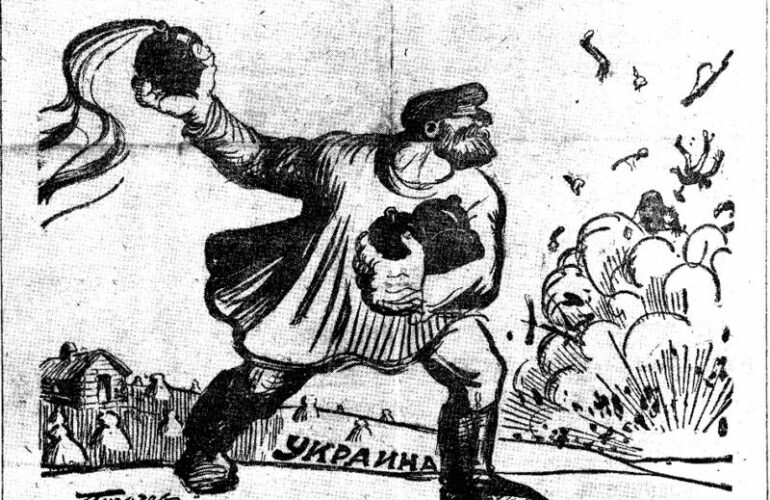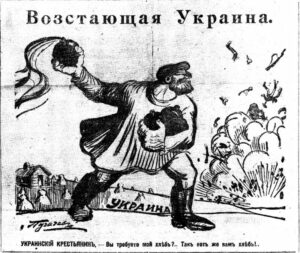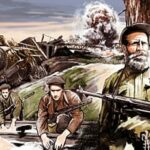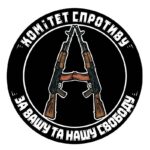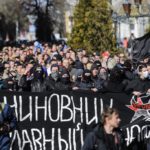Recently we published an interview with participants of International Leninist Trotskist Fraction, who are now fighting in Syria. Now, the participants of Anarchy Today team are answering their questions about the current situation in BUR.
1) We have seen, before Putin’s invasion, tough struggles of the working class in Belarus. We wanted to ask you, how the workers’ movement is confronting the government of Lukashenko and his partner Putin?
The largest protests of thousands of workers in modern Belarus took place back in 1991, formally still in the USSR. In 1993, a strike broke out in the Minsk metro, which was suppressed by the Streichbrechter (cops). In the same year, The Belarusian Congress of Democratic Trade Unions, uniting independent trade unions, was founded. After Lukashenko came to power in 1994, all trade unions (except for The Belarusian Congress of Democratic Trade Unions, but it had no weighty power) were subordinated to the state and were converted into yellow unions. Unfortunately, Belarus does not and has not had a tradition of radical trade union struggle. In 2020, during the protests in most factories, the workers had no idea how to fight, there was no experience of radical struggle. Even though they began to form strike committees, they did not manage to organize a general strike. The majority of workers lacked not only revolutionary consciousness, but even protest consciousness, there was no sense of all-Belarusian solidarity.
Anti-Lukashenko movement united people of different social strata. There were intellectuals, students, workers, farmers even top businessmen and some police officers. Everybody had their reasons to protest. A new worker’s movement appeared, they called for a general strike. Some collectives actually stopped work. This was accompanied by blocking the roads. One of the aims of this was to disorganize work and prevent people from getting to work on time. Yet, this movement was not strong enough. Even at its peak most industry functioned. The workers’ leaders were arrested or had to leave the country.
In 2022 the authorities finally dissolved The Belarusian Congress of Democratic Trade Unions. The leaders were imprisoned. Today there are disgruntled workers on the ground, but no resources to fight. Any attempt at grassroots organizing faces not only dismissal, but also prison sentences.
2) Belarus was not the first nor the last country invaded by Putin to crush a huge uprising. What can you tell us about the uprising in Kazakhstan, before that in Georgia and the Caucasus, and Putin’s counterrevolutionary invasions?
How do you fight to get the unity of the oppressed against the murderous regime of Moscow and imperialism that plunders these nations?
There were several uprisings in Kazahstan in recent years. The latest one was in January 2022. It started in the workers’ district of Zhanaozen where a decade ago, in 2011 there were serious workers protests and the troops started shooting and killed 20 workers. In 2022 the riot spread throughout the country, it started with economic demands, as a protest against increased gas prices but further people tried to overthrow the regime. They stormed the presidential residence and attacked the police. The authorities switched off internet in the whole country as well as mobile phones and imposed martial law. Many people were injured, we don’t have information if any protesters were killed. According to official reports about 500 police vehicles were destroyed. Putin (officially the CSTO – Collective Security Treaty Organization) sent troops, which helped to restore law and order and quickly withdrew. Everything happened so quickly that anti-totalitarian forces in Russia even if they had the resource just did not have time to offer any help to the Kazakhstan rebellion.
Before that, in 1994 Russia started war against Chechen republic which was de-jure part of Russia (de-facto had proclaimed independence). The war resulted in numerous casualties in Chechen civilian population and was conducted with the only purpose of bringing the rebellious territory back to the empire. Russian army won the war but its outcome was establishing the totalitarian regime of Kadyrov, who is loyal to Moscow in return for huge investments and the right to do what he pleases in Chechna.
Later, basing on existing ethnic conflicts Russia invaded South Osetia (part of Georgia) and joined it to the empire.
Actually, all the official ideology in Russia is based on the idea of huge empire, a superpower which can dominate the others and this is what the anarchists of BUR have always opposed.
3) From afar it can be seen that Putin is trying to maintain his role of gendarme defender of the capitalist system throughout Eurasia, but NATO is allowing this less and less….
In France, as in Spain, Belgium, England and even Germany, we have seen enormous strikes. How do you think that the workers of Maastricht Europe can unite in their struggle with the workers of the countries of Eastern Europe?
This is a difficult question. First, we don’t think that big business in Europe is now really caring about the sufferings of Ukrainian (or Russian) people. For them the war brings profit. Also, as far as we can see from afar, most industrial action is because of the economic problems. The prices have gone up and the salaries remain low. People want more social justice but taking more control over production is not a priority. Sadly, the bad economic situation is due to sanctions and refusal from cheap raw materials from Russia and many working class people would agree to restoring economic relationships with Russia even if on personal level they don’t like Putin regime. This is especially true about Eastern Europe which suffers more from the problems caused by the war. Underprivileged people feel dissatisfaction with the government policies and when the government says “We need to sacrifice for the victory of democracy in Ukraine”, they would say (or think) the opposite. The other side of the problem is that another part of society uncritically believes the government propaganda and is caught in the trap of militarism and nationalism. In an attempt to resist the threat from the East the governments in Eastern Europe are resembling the Russian and Belarus regimes more and more.
It seems to us that the working class in the EU lives much better than in the BUR, and they hardly think about workers from Eastern Europe. In any case, once the war is over, Eastern European workers will need the support and expertise of Western European unions to resist the Western capital that will undoubtedly flow into Ukraine. Also important is the question of workers’ values. We do not think that today the proletariat is a homogenous element, and certainly not a revolutionary one. Certainly not in our region. We do not idealize the workers, because we see that not only do they lack the courage to fight, but their goals do not go beyond increasing wages. All of us still have a lot of work to do to promote the idea of workers’ self-organization, the struggle for a change in values, and not just for temporary concessions. But it is the workers themselves, not the intellectual elites, who should be interested in this.
4) For the majority of the social-imperialist left, mostly the Communist Parties that lead hundreds of trade unions all over the world, Putin should be supported against Ukraine, as Ukraine, according to them, “would be fighting on behalf of NATO”. What would you say to those who support the jackal of all Russias?
Before attacking Ukraine Russian authorities suppressed all opposition within the country. No independent trade unions exist, no opposition parties exit. The anarchist movement has been smashed, anarchists were tortured and sent to prison for up to 20 years (yet not a single human being had been killed by anarchists). Recently a liberal protester (Anatoly Berezikov, 35y.o.) died of torture in a police cell (he was arrested for spreading leaflets).
The Belarus uprising was defeated, anarchists, as well as liberal revolutionaries are either in prison or left the country. No independent trade unions, no opposition parties.
“Undesired” books are being removed from the libraries, internet sites blocked, there is no limitation to using face recognition technologies. People, who dare have their own opinion are not allowed to teach at schools or universities.
Besides, Russian population (outside Moscow and Petersburg) is very poor. The stories about Russian soldiers looting TVs and toilet seats as war trophies are not an exaggeration. The regime is increasing its pressure to dependent countries, like Kyrgyzstan and Kazakhstan, forcing them to give out the people who found a refuge their. Now they are bringing repressions, totalitarian control, tortures and death to the people of Ukraine. So Putin in no way is a cure for the problems workers in the West have. Communist Parties maybe OK with repressions but we are not. Supporting Putin in any form is both immoral and unpractical.
5) We have seen a report by a French journalist on the fighters in Ukraine, who was on the war front, from May 2022.
This report shows that there are real revolutionaries, anarchist, some claiming to be Trotskyists, others claiming to be libertarian communists, who are on the front line against Putin’s invasion. What do you think of this movement of partisans who are on the front line? What should be their military relationship with the Kiev army?
Yes, there are anarchists and libertarians on the front line. But this is not a partisan movement- they are part of regular Ukrainian army. First, there was an attempt to form an anti-authoritarian squad within Ukrainian Territorial Defense forces that would be organized on anarchist principles but this did not last long. First, they were not allowed to invite new comrades from abroad, also they kept them away from frontline and then Territorial Defense was completely incorporated into the army structures. The organiser of the unit Juri Samoilenko was killed in action. Now anarchists both Ukrainian and from other countries (including Russia) are fighting in different units where they are trying to maintain anarchist principles and talk to their comrades-in -arms about their ideas.
If you ask us – this should be different, the anarchists should have their own military formations and fight for their own agenda. But in the present situation this is unrealistic.
6) Some of the revolutionaries left their lives on the front in Ukraine, like your comrade Dimitry Petrov. In the aforementioned report they affirm that a victory of Putin would be a heavy defeat for the workers and the peoples that Great Russia oppresses. On the contrary, they affirm that, with the victory in Ukraine and with weapons in hand, the workers would be in an unbeatable condition to confront imperialism and the Zelensky government. What is your opinion in this matter?
We would generally agree with Dmitry. To this we would add that not all Ukrainian anarchists fight in the war. A lot of them prefer to take part in self-organised structures to support civilian population and organise evacuation and supply. In Ukraine grass-root movements of solidarity and mutual support are very strong. The volunteers play a huge role in supplying both the front and the civilians, providing people with food and clothing, evacuating people under fire, providing medical help. The war teaches people to organize without the government and this also gives hope for the future.
We do not know what the future will look like, but if Ukraine wins, there is hope for positive changes in all spheres of life, including the economy. A lot of effort will go into rebuilding the ruined country, there will be many new jobs, and there will be capitalists who will try to enrich themselves on this. Most likely, the West will begin to do everything possible to subjugate this country as much as possible. There is no doubt that various political forces will oppose the emergence of the cult of Zelensky and the strengthening of the power of the president and his “Servant of the People” party, because in socio-economic terms (not in military terms) the policy of the ruling elites leaves a lot to be desired. We very much hope for the lustration (including by radical methods) of all these parasites. We would like to believe that ordinary people will find the support of the former military who will not tolerate humiliation and exploitation. They will have combat experience, weapons, and nothing to lose. That is, they can easily direct their bayonets at bribe-takers and exploiters: politicians, bureaucrats, and businessmen.
7) What appeal can we make, even in common, to the Russian youth, which, as we understand, many of them run away in order not to be enlisted in the army, even defect at the front and thousands are in prisons for refusing to go to fight?
For our fight in Syria this question is a matter of life and death, since today it is about doing an upheaval at the rearguard of Al Assad and Putin who supports him.
The ideas of free market, of fascism, of Soviet style socialism have been thoroughly compromised. The position of just doing nothing and letting it go has led to involvement into huge war for the interests of the ruling class in which you are just a cannon fodder. Yet, human dignity, structuring the society from below, cooperation and in general regaining control over your life – this is what we call anarchy – these ideas remain strong. Whatever you choose to do, wherever you are – in immigration, in prison, in an underground group or just secretly supporting the fight which is going on, under pressure – these ideas will help you to remain strong as they help us. Whatever your situation is – there is always a place for some anarchy around you.
8) We are very interested in knowing some conclusions that you would like to share with us, after 12 years of revolution and counterrevolution in Syria.
None of us have been in Syria, so we would rather leave the analysis to those who live and struggle there. E.g. – t.me/azatyutun
www.facebook.com/RewolucjaRojavy/
9) As we mentioned before, comrade anarchists in Greece are on hunger strike, such as Giannis Michailidis, Georgia Voulgari and Thanos Xatziagkelou. What can we do in common to fight for the immediate and unconditional freedom of all of them?
There are many anarchist prisoners around the world. Here is the annual Anarchist Black Cross list of 2022 solidarity.international/wp-content/upl…. Apart from Greece, there are many anarchist prisoners in Belarus and Russia, some of them serving up to 20 years in prison. Immediate and unconditional freedom for all of them can only be achieved by revolution. Even then, the new governments can be reluctant to let out prisoners accused of “violent” crimes. What we can do now is to continue their struggle and to popularise their deeds, so that the people knew their names and supported them and insisted on liberating them all when there is a chance. It is also very important to keep in touch with the prisoners so that they feel our support and so that all the facts of torture became known. And of cause if there is a chance to set somebody free by force this should be used.
10) Today there’s fighting in France. In Latin America, reformism is seeking to turn the enormous anti-imperialist revolutionary upsurge into electoral traps. In the Middle East the fire of revolution has not been extinguished. We have fraternal relations with the Zengakuren students of Japan who marched by the thousands against the G7. What message would you send to all of them?
We can only wish success to all those who are fighting against oppression.
11) We have published dozens of articles and a book on the Ukrainian question, which also deals with the conditions of struggle of the working class in Russia. But we know what it is to be in the war itself, where words are not enough. What do you propose to the revolutionary currents of the world to fight together and do a common struggle at those high points of the class struggle, like Ukraine?
First of all, both in Syria and in Ukraine, revolutionary movements need to gain combat experience and try to build their own structures: people’s militias, militia groups, etc. Create networks of solidarity with ordinary people, conveying to them the ideas of social justice, grassroot self-organization and workers’ self-government (as the Sodlilarity Collectives do – t.me/SolidarityCollectives). To lay the foundations of direct democracy now, which will help in the construction of a new society after the war. In today’s situation, it seems to us, all forces must go into the fight against the occupiers and only after victory should we be thoroughly engaged in active creative work.
As for Ukraine, you should understand that Ukrainian workers and society as a whole have post-Soviet trauma and everything that is in any way associated with “communism” has been discredited. On a wave of anti-Russian euphoria, not only monuments to Lenin, but also to other Soviet figures, soldiers, etc., are pulled down, and leftist ideas are easily overshadowed by neoliberal ones. In addition, part of the world communist, Trotskist and even anarchist movements either support Russia and do not consider the Ukrainian people as a political entity, or take a dangerously neutral position. Therefore, it will be difficult to return the good name to the progressive values of freedom, equality, direct democracy and mutual aid in the future. But we will do our best!

